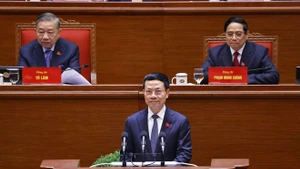AI has been identified as a key technology under the National Strategy on Research, Development and Application of Artificial Intelligence to 2030, as approved by the prime minister on January 26, 2021. The strategy’s main objective is to make Viet Nam a regional and global innovation hub for AI, to rank among the top four ASEAN countries in AI research and application, and among the world’s top 50 nations in AI development. The strategy also emphasises the need to build a comprehensive legal system and regulatory framework for AI.
According to Dr. Pham Thi Thuy Nga from the Institute of State and Law (Viet Nam Academy of Social Sciences), legislation plays a crucial role in guiding and safeguarding academic integrity. She has stressed the importance of requiring disclosure of AI use — not only in technical aspects (algorithms, training data) but also ethical considerations (social impacts, potential biases) — to preserve the legitimacy and transparency of knowledge produced. Since AI is not a legal entity, and does not possess will, morality, or legal responsibility, any negative consequences arising from its use must be explicitly attributed to the individuals or organisations involved.
A clear policy framework will provide the foundation for defining boundaries and responsibilities in data processing, fostering safe innovation in businesses and research institutions, and aligning Viet Nam’s AI development with international standards. Such a framework would not only serve as a regulatory tool but also as a foundation for safe and human-centred AI advancement.
Many countries around the world have already established comprehensive AI policy frameworks. For example, the US passed the Algorithmic Accountability Act in 2022; Canada introduced the Artificial Intelligence and Data Act in 2023; and the European Union adopted the AI Act in 2024. In Asia, China has been among the earliest to build a comprehensive, focused, and strategically oriented AI policy framework. Beyond the launch of a strategic plan for “next-generation AI development,” China has translated this vision into specific regulations, including the “regulations on the administration of internet recommendation algorithms” and the “regulations on AI-generated content.”
China’s Ministry of Science and Technology has also issued “ethical guidelines for AI,” emphasising a human-centred approach, fairness, safety, and accountability. Japan, meanwhile, has published its “basic guidelines on AI ethics” and set up its Expert Council on AI under the Basic Act on Science, Technology, and Innovation.
In early 2025, Japan enacted legislation to promote AI research, development, and application. A key provision of this law requires cooperation and information sharing among developers, distributors, and users of AI systems. Such legally binding mechanisms strengthen governance capacity, particularly for high-risk AI systems.
So far, Viet Nam’s AI policy framework remains rudimentary, largely limited to strategic orientations and indirect regulation through existing provisions on information security, intellectual property, and personal data protection in the Law on Cybersecurity (2018), the Law on High Technology (2008), and the amended Law on Intellectual Property (2022). Current regulations on AI are still general in nature and have yet to fully address AI-specific issues such as the legal liability of autonomous systems, access to training data, algorithmic oversight, and transparency in AI decision-making.
According to Dr Truong Thi Thu Trang from the Institute of Social Science Information (Viet Nam Academy of Social Sciences), so far, Viet Nam’s AI policy framework remains rudimentary and is largely limited to strategic orientations and indirect regulation through existing provisions on information security, intellectual property, and personal data protection in the Law on Cybersecurity (2018), the Law on High Technology (2008), and the amended Law on Intellectual Property (2022).
Current regulations on AI are still general in nature and have yet to fully address AI-specific issues such as the legal liability of autonomous systems, access to training data, algorithmic oversight, and transparency in AI decision-making. Therefore, to meet practical demands in the context of fast-paced and increasingly complex AI development, it is essential to promptly introduce a legally binding policy framework, along with ethical guidelines, technical standards, and safety protocols tailored to national conditions.
Dr To Van Truong, former Director of the Southern Institute of Water Resources Planning, emphasises that an AI policy framework should function as a strategic system to encourage innovation while managing risks, ensuring societal benefit, and recognising AI as strategic technological infrastructure linked to digital economy goals and national competitiveness.
For effective implementation, he suggests the establishment of a central coordinating body, such as a national committee on artificial intelligence, with transparent oversight mechanisms and community consultation channels. This would enable public and civil society participation in policymaking, ensuring user protection and building trust for businesses and investors to confidently develop AI products.
The policy framework must also foster genuine innovation and international cooperation. Measures such as tax incentives, R&D support funds, and especially controlled experimentation programmes (AI sandboxes) should be widely deployed.
The success of this mechanism depends directly on high-quality human resources and a flexible legal environment. Moreover, ethical principles and social responsibility must remain foundational, embedded from the outset into the legal framework and technical standards.
A robust policy framework is not only a legal safeguard but also a driver for AI to become a tool for sustainable development. At recent forums, many experts have argued that Viet Nam’s AI policy must strike a delicate balance between technological advancement and the protection of core human values.
By integrating clear governance mechanisms, open data strategies, community participation, and ethical foundations, Viet Nam can build a dynamic and trustworthy AI ecosystem while ensuring that the country is not left behind in the digital age.
















